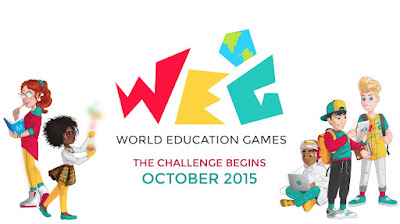PakAlumni Worldwide: The Global Social Network
The Global Social Network
Pakistan Youngsters Crowned World Champs at Education Games 2015
Pakistanis were crowned World Champions and won the Maths World Cup, with Malaysia taking second place and the Literacy World Cup and Australia claiming third place overall and the Science World Cup, according to a report in Australia's The Educator publication.
World Education Cup 2015 saw student competitors from 159 countries earn 169 million UNICEF points, and raise more than $100,000 which will help 33,000 kids go to school.
The event was hosted by 3P Learning, an Australian company internationally renowned for its online education resources including Mathletics. Its CEO, Tim Power, said he had seen a big improvement in the results of STEM education subjects. World Education Games is a free downloadable program for registered schools for students to use.
Pakistan's winning team members included Ali Saud Khan (Grade 9), Abeeha Saud (grade 4) and Emaan Fatimah (Grade 7) from Beaconhouse school in Mandi Bahauddin, Lahore, according to The Express Tribune newspaper. The goal of the annual event is to ensure that students have 21st century skills to be prepared for the jobs of tomorrow.
Pakistani kids are now increasingly visible on the international stage in global competitions. Recently, an exceptionally bright student of PakTurk International School in Jamshoro brought home a gold medal after competing in Math Challenge V hosted by the Pan-Asia International School in Bangkok. In 2013, Khadija Niazi, then a 12-year-old Pakistani girl attending advanced MOOCS (Massively Online Open Courses) was featured at the World Economic Forum in Davos, Switzerland. In 2012, four teams of Pakistani students won five medals, including one silver, in four international science competitions.
After seeing its youngsters win several international competitions, Pakistan has now decided to host the 48th International Chemistry Olympiad (IChO) in Karachi next year at the International Centre for Chemical and Biological Sciences (ICCBS), University of Karachi (KU).
Although access to quality education remains quite limited in Pakistan, it is still encouraging to see some Pakistani youngsters excelling in STEM fields at the international level. I hope these wins will help inspire more young Pakistanis to pursue and excel in math and science education.
Related Links:
Girl's Journey From Karachi Slum to Harvard Business School
12-Year-old Pakistani Girl at World Economic Forum
Pakistani Kids Outperform Indian Counterparts in Math and Reading
-
Comment by Riaz Haq on September 14, 2022 at 10:44am
-
A Babar Azam cover drive question appears in Pakistani physics book, PIC goes viral
https://zeenews.india.com/cricket/wait-what-a-babar-azam-cover-driv...Here's the question: "Babar Azam has hit a cover drive by given kinetic energy of 150J to the ball by his bat. a) At what speed will the ball go the boundary if the mass of the ball is 120g? b) How much kinetic energy footballer must impart to a football of mass 450g to make it move at this speed?" says the question that has been widely shared on social media platforms."
The picture of this question in the book has gone viral on the internet with some fans even trying to find the answer.
https://twitter.com/shaun_tait32/status/1569662589462024192?s=20&am...
(Picture shows the following kinetic energy = 0.5x mass x velocity squared. 120 grams ball driven with 150 joules energy achieves 50 meters/sec speed)
Comment
Twitter Feed
Live Traffic Feed
Sponsored Links
South Asia Investor Review
Investor Information Blog
Haq's Musings
Riaz Haq's Current Affairs Blog
Please Bookmark This Page!
Blog Posts
PFX to Advance Pakistan Air Force Modernization
Pakistan has unveiled its PFX (Pakistan Fighter Experimental) program as a significant upgrade to its JF-17 joint program with China. The new upgrade will have a number of stealth features ranging from the use of radar-absorbing composite materials and diverterless supersonic inlets (DSI) to internal weapons bay (IWB) which will significantly reduce the aircraft's radar signature. It is targeted for completion by the end of this decade. In addition, the PFX's twin-engine design will improve…
ContinuePosted by Riaz Haq on January 20, 2025 at 1:00pm — 1 Comment
Pakistan to License Multiple LEO Satellite Internet Service Providers
The Pakistan government is preparing to license three low-earth-orbit (LEO) satellite operators for space communication services in the country, according to media reports. The companies whose applications are pending include London-based OneWeb, China's Shanghai Spacecom and US headquartered Starlink. They operate tens of thousands of small mass-produced satellites in low orbits that communicate with designated (mobile and stationary) ground stations. Each LEO satellite circles the earth…
ContinuePosted by Riaz Haq on January 15, 2025 at 1:30pm — 2 Comments
© 2025 Created by Riaz Haq.
Powered by
![]()

You need to be a member of PakAlumni Worldwide: The Global Social Network to add comments!
Join PakAlumni Worldwide: The Global Social Network